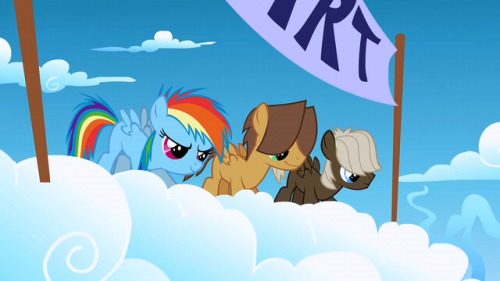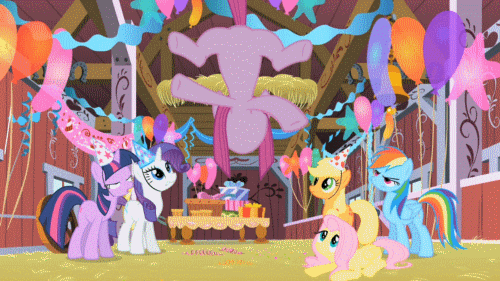Martintox Presents: Disorder Reviews
Rating System
----
MY LITTLE PONY: FRIENDSHIP IS MAGIC

Rating System
I have a new album and a new Disorder Reviews blog.
----
MY LITTLE PONY: FRIENDSHIP IS MAGIC

Creator: Lauren Faust
Director: Jayson Thiessen, James Wootton, Jim Miller, Denny Lu, Tim Stuby, Mike Myhre
Music: William Anderson, Daniel Ingram, Caleb Chan, Steffan Andrews
Distributor: Hasbro
Initial Airing Date: 10 October 2010 - 12 October 2019
# of Episodes: 222
Genre: fantasy
----
TV animation has a wider demographic than ever before, but not just for the reason you might think. Yes, the mainstream breakthrough of adult shows has given additional legitimacy to the medium, but the people who watch cartoons today are in no small part those who grew up with them. Many shows from the past have their devoted fandoms, and the nostalgia for them has led to reboots meant not just for a young or general audience, but fans of the original as well. Watching cartoons as an adult isn't as unusual as it once was, but even with the strides TV animation has made, it doesn't have the same artistic credibility as most other forms of art. For example, commercial juggernauts like the Marvel Cinematic Universe do little to undermine cinema's rich history of boundary-pushing works. There have been some genuinely great shows in the creator-driven 90s and 2000s, but today, TV animation is still primarily a family-friendly merchandising exercise; after all, regardless of their quality, older shows like Transformers were ultimately made to promote a toy line. When your hobby has such an unflattering history, it's hard not to feel like you have to justify yourself in some form, which is why a conversation on any particular cartoon is likely to involve the words: "it's good for a kid's show."

It's still a little surreal to think of how massive My Little Pony: Friendship Is Magic was for some time. When Amid Amidi used it as proof of the end of creator-driven cartoons, it was only due to the presence of talents like Lauren Faust and Rob Renzetti; there was no doubt in his mind that the show itself was a formality to sell toys, just like the 1986 cartoon beforehand. In fact, I'm willing to wager that Faust's involvement was the main reason people outside of the target demographic even bothered with FIM at first, and if anyone checked it out after the initial explosion, it was to see what the buzz was about. I was one of the latter: I watched the whole thing back when it still only had one season, and I found it was perfectly alright. Yeah, it's an episodic show where horses have wacky adventures and learn how to be respectful and compassionate, and it works based on that simple premise. It doesn't look too bad, the songs are fairly catchy, and most importantly, the writing isn't overly simplistic: the main six characters, in addition to the plethora of side roles, are interesting and dynamic enough to keep the viewer interested in their many interactions. By and large, it's solid. It's definitely better than you would expect from a show aimed at young girls... but does that really mean much?
The problem with discussing "cartoons" is that the format has such a mixed connotation that you have to add a disclaimer to your own opinion. Even people who grew up watching them will often speak positively of what they enjoyed as a kid and think little of what came after they grew up. The simple notion of a cartoon, particularly a brand-driven one, inspires little confidence in someone who's looking for more than simple entertainment. Consequently, when such a show is better than anticipated, there is an inclination to say that it's good -- not on a general standpoint, but based on the low expectations that people might have. This approach doesn't do any favors to the medium and how it's perceived. For one, it's reductive of the level of quality that cartoons have attained many times before, regardless of financial motives or any restrictions made to ensure a low age rating. For another, it comes off as a flimsy excuse to blow one's admiration of a show out of proportion, should it exceed this standard by even the smallest margin. All this does is make outsiders want to dismiss any acclaim as pure fanaticism. When it comes to cartoons, a lot of fandom "toxicity" is the result of people taking the things they like much too seriously; as you can guess, such individuals would be the ones to make a big deal out of something that's merely better than some of its contemporaries.

I lost interest in Friendship Is Magic around the time the second season started. Back then, my only explanation was that I felt something was off, but the most probable reason is the show had already given me everything I wanted, and watching anything more would be redundant. Even if I had kept watching, I doubt I would have persevered through nine whole seasons. I'm sure a lot of things happen and plenty of characters get introduced in those 200+ episodes, but the underlying principle of the show is bound to stay the same throughout, and all this worldbuilding won't help me get more interested in the formula. Furthermore, if you've read my review of SCP Foundation, you already know that I don't care to have lore for the sake of it. I'm sure there are plenty who were invested enough to stick to the end, and I'm glad for them if the formula didn't get stale, but even in that case, Friendship Is Magic is not some kind of breakthrough in the cartoon industry; it's a solid show that makes efficient use of its simple and unambitious premise. You don't need to pretend it's anything more or append "pony" to half your vocabulary to justify your appreciation for it. It's "good for a kid's show", but that only means it's pretty good. To act like it's anything special just because little girls would have made do with much less is just an insult to the staff that worked on it.
----
PERSONAL RATING: READ
RECOMMENDATION RATING: THE
LETTERED RATING: REVIEW
----
THE UNDERTALE REMINDER
PERSONAL RATING: READ
RECOMMENDATION RATING: THE
LETTERED RATING: REVIEW
----
THE UNDERTALE REMINDER
You know, Undertale is far from perfect, but it's actually fairly unique in the realm of video games, so unlike FIM, there is actually a solid reason for its massive popularity.








